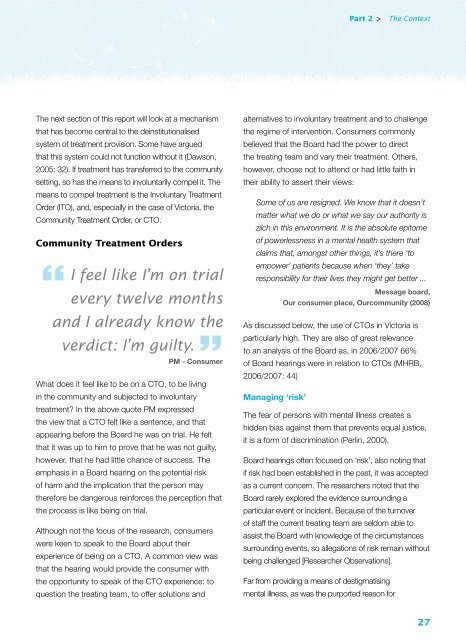Lacking Insight - Community Law
Lacking Insight - Community Law
Lacking Insight - Community Law
- No tags were found...
You also want an ePaper? Increase the reach of your titles
YUMPU automatically turns print PDFs into web optimized ePapers that Google loves.
Part 2 > The ContextThe next section of this report will look at a mechanismthat has become central to the deinstitutionalisedsystem of treatment provision. Some have arguedthat this system could not function without it (Dawson,2005: 32). If treatment has transferred to the communitysetting, so has the means to involuntarily compel it. Themeans to compel treatment is the Involuntary TreatmentOrder (ITO), and, especially in the case of Victoria, the<strong>Community</strong> Treatment Order, or CTO.<strong>Community</strong> Treatment Orders“I feel like I’m on trialevery twelve monthsand I already know theverdict: I’m guilty.”PM - ConsumerWhat does it feel like to be on a CTO, to be livingin the community and subjected to involuntarytreatment? In the above quote PM expressedthe view that a CTO felt like a sentence, and thatappearing before the Board he was on trial. He feltthat it was up to him to prove that he was not guilty,however, that he had little chance of success. Theemphasis in a Board hearing on the potential riskof harm and the implication that the person maytherefore be dangerous reinforces the perception thatthe process is like being on trial.Although not the focus of the research, consumerswere keen to speak to the Board about theirexperience of being on a CTO. A common view wasthat the hearing would provide the consumer withthe opportunity to speak of the CTO experience: toquestion the treating team, to offer solutions andalternatives to involuntary treatment and to challengethe regime of intervention. Consumers commonlybelieved that the Board had the power to directthe treating team and vary their treatment. Others,however, choose not to attend or had little faith intheir ability to assert their views:Some of us are resigned. We know that it doesn’tmatter what we do or what we say our authority iszilch in this environment. It is the absolute epitomeof powerlessness in a mental health system thatclaims that, amongst other things, it’s there ‘toempower’ patients because when ‘they’ takeresponsibility for their lives they might get better ...Message board,Our consumer place, Ourcommunity (2008)As discussed below, the use of CTOs in Victoria isparticularly high. They are also of great relevanceto an analysis of the Board as, in 2006/2007 66%of Board hearings were in relation to CTOs (MHRB,2006/2007: 44)Managing ‘risk’The fear of persons with mental illness creates ahidden bias against them that prevents equal justice,it is a form of discrimination (Perlin, 2000).Board hearings often focused on ‘risk’, also noting thatif risk had been established in the past, it was acceptedas a current concern. The researchers noted that theBoard rarely explored the evidence surrounding aparticular event or incident. Because of the turnoverof staff the current treating team are seldom able toassist the Board with knowledge of the circumstancessurrounding events, so allegations of risk remain withoutbeing challenged [Researcher Observations].Far from providing a means of destigmatisingmental illness, as was the purported reason for27
















